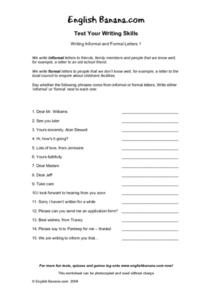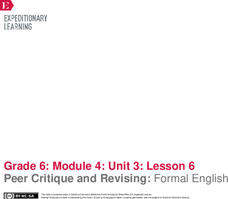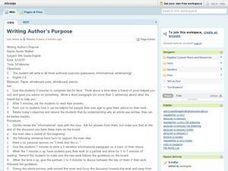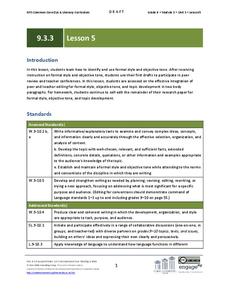ReadWriteThink
Style-Shifting: Examining and Using Formal and Informal Language Styles
Your high schoolers are probably versed in two languages: formal language, and informal conversation. Help them identify the correct language style for their audience and context with a thorough lesson and examples of different speech...
Curated OER
Formal and Informal Language
Words carry connotative baggage and some suitcases are bigger than others. Learners consult the Chambers School Dictionary to identify the formal, informal or slang words used in a series of exercises.
Curated OER
Writing Formal Letters
Help your young writers recognize the importance of composing formal letters. Middle schoolers read letters written by Thomas Jefferson and analyze the components that make it a formal letter. They will then compose their own letters.
Curated OER
Formal versus Informal Language
Engage in an activity that focuses on the concepts of formal and informal language use. Middle and high schoolers compare and contrast each style by using a Venn diagram that includes some examples. They read and hear a passage of lyrics...
EngageNY
End of Unit Assessment: Drafting the Informative Consumer Guide
Not all sandwiches are edible. Scholars use a Quote Sandwich graphic organizer to draft the written content of their informative consumer guides. Additionally, they view a mini-lesson on formal writing.
Fluence Learning
Writing an Argument: Is Electronic Communication Helpful or Harmful?
Technology has undoubtedly improved the lives of people around the world—but has it improved communication? Seventh graders read two informative passages about the rise of texting and emailing versus in-person conversations before...
Curated OER
Letter Writing: Social Action Project
Help your pupils sharpen their letter writing skills. They compose business letters that include greetings, headings, closings, and a professional tone for a philanthropic organization requesting information. Use this resource to...
Schoolwires
12th Grade Expository Reading and Writing Research Project
The beauty in this resource is the lengthy list of highly charged, controversial-issue research topics. Categories include issues of race, politics, law, environment, education, athletics, gender, and technology. After selecting a topic,...
Curated OER
Further Improvements of Writing Skills
Improve writing skills by finding a personal writing style, using descriptive language effectively, and using precise language. Middle schoolers discuss individual style in writing and formal and informal language. They utilize figures...
Curated OER
Organizing by Writing
Middle schoolers analyze how to use writing for generating and organizing their thoughts before communicating them. They use the questions on the first handout to organize a three-minute introduction of themselves to their small group....
Curated OER
Writing Informal and Formal Letters
An informal/formal letters worksheet asks pupils to label the 15 greetings, salutations, and wording of passages from sample letters as being examples of either informal or formal writing.
California Department of Education
Hitting the Write Note: Writing a Proposal
To whom it may concern ... Scholars undergo the process of writing a letter to an authority figure. The activity asks writers to compose a formal letter requesting a music therapy space. Pupils learn how to submit a project proposal to...
Curated OER
Writing an Informal Letter
What is the difference between formal and informal letter writing? Who gets a formal letter? What about an informal letter? This reference page presents different introductions and phrases you might see in each type of letter, and then...
EngageNY
Peer Critique and Revising: Formal English
Dear Sir or Madam: What's the difference between formal and informal language? Scholars focus on using formal English and transitions in their position papers. After revising their rough drafts, they engage in the peer editing process...
California Education Partners
Eleven
It is difficult to articulate how growing up feels as accurately and beautifully as Sandra Cisneros does in her short story "Eleven." After seventh graders read the story and note the author's use of figurative language, they respond to...
Trinity University
Explain Yourself: An Expository Writing Unit for High School
Introduce expository writing with a unit that asks writers to craft an essay to explain a belief, value, or priority that is important to them. Mini-lessons within the unit focus on crafting thesis statements and conclusions, selecting...
Curated OER
Be Your Own Chief Editor
The value of this punctuation and grammar lesson is in the SMART board presentation, which takes pupils through the proofreading process. It would be a good way to introduce the idea of proofreading in your class before beginning a unit...
Teach It Primary
What Letter Will You Write?
After reading "The Pied Piper of Hamelin," scholars discuss the emotions the events provoked in its characters. In pairs, writers compose a letter depending on the topic and style of their choice then reply to their own or a peer's...
University of North Carolina
Literature (Fiction)
An informative installment of the Writing for Specific Fields series helps readers learn how to interpret and write about fiction. The website details nine easy steps for writing a literary analysis—a useful method for all readers!
Curated OER
Writing Author's Purpose
Write in all three authorial purposes (persuasive, informational, entertaining) with this lesson. Young writers consider a time when a friend of theirs helped them out and gave them advice on something. They write a short paragraph (no...
Curated OER
Writing - Letters
The basic structure of a useful lesson in formal letter writing is here, but there are no procedural details or support materials to implement it. However, the idea is worth pursuing, to help your learners develop a strong understanding...
California Education Partners
Vincent Van Gogh
Living in someone's shadow would be difficult for anyone, including one of the most talented artists of the modern age. Middle schoolers read an excerpt from Vincent Van Gogh: Portrait of an Artist by Jan Greenberg and Sandra Jordan...
Channel Islands Film
Santa Cruz Island - Writing for Information
After re-viewing a documentary segment on the restoration of Santa Cruz Island,, individuals craft an essay in which they compare the views of the various stake holders featured in the video and identify the point of view they find the...
EngageNY
Grade 9 ELA Module 3, Unit 3, Lesson 5
Class members examine examples that model how to develop and maintain a formal style and an objective tone in informative/explanatory writing. They also engage in a peer review activity and revise their work based on the feedback.

























